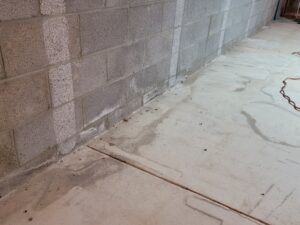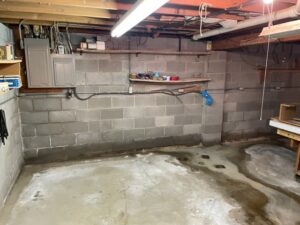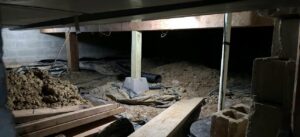Damp Basement? Steps You Can Take
Various things can cause a damp basement. Where exactly the dampness is coming from can be tricky to pinpoint. Therefore, we have created this quick and simple guide of basic things that you as a homeowner can check for.
Fix Gutters and Downspouts
An important first step to preventing a damp basement is to make sure that your house has appropriate gutters and downspouts. Gutters catch the rain and channel it to the downspouts, which direct it away from the house. Make sure the downspouts have 4- to 6-ft. horizontal extensions to move the water away from the house. If you already have them, make sure that they are regularly cleaned out. A gutter clogged with leaves, sticks and other debris can cause a leaky roof or water damage to the interior or exterior of your home. How often you need to clean your gutters will greatly depend on how many trees you have in your yard. But a good rule of thumb is to clean them at least every spring and fall.

Use a dehumidifier
Eliminating the sources of humid air will help dry out your damp basement. Many times the first thing to come to mind is to run a dehumidifier to lower the indoor humidity. But there are also some other good tips to keep your basement from getting damp.
- Seal leaky dryer vents with foil tape to prevent unwanted humid air from entering your basement. Make sure to not use duct tape, this will eventually fall off.
- Add a vent fan to your basement bathroom and make sure your family turns it on during showers.
- Keep your basement windows closed during humid weather.
- Run air conditioning upstairs when it is humid outside. Humidity from upstairs is heavy in the air and will fall and cause a damp basement. Air conditioning will keep your air upstairs drier making it much easier to achieve drier basement air.
Check for plumbing leaks
Routinely inspect the visible pipes in your house. If you see rust, buckling, or drops of water, this is a good sign that something is wrong. Catching an issue with the plumbing in your house early can save you time and money and help keep your basement from being damp and damaging any valuables in your basement.
DIY Options to Avoid
Thanks to effective marketing and scare tactics, many homeowners turn to waterproof paint. The idea of this product is to paint it on your basement walls and it will block water from entering. This method only acts as a bandaid. It does not actually get to the root of the problem and will not divert water away from your walls. The water is still going to be there. Waterproof paints are not a good investment of time or expense.
If All Else Fails
If your efforts to dry up your basement on your own have not gone well, contact us for a free estimate. One of our knowledgable basement inspectors will come up with a common sense approach that is easy to understand. We believe in our waterproofing methods enough that we do not resort to high pressure sales or gimmicks. Give us a call and we can solve your damp basement problem for good!
Keep up with us by following us on Facebook!





